During this period ERB's behavior
is absolutely zany. Unable to stay put in LA he moved to Coronado
which is a sand spit on the west side of San Diego Bay. North Island
Naval Air would be built just North of it. The Carriers used to be
docked on the ocean side as their draft was too great for the bay.
Disliking Coronado he moved back across the bay to the first low ridge
of hills that separates the city proper from the bay. He apparently
was near the crest as he said he could look over it to the East.
When I was in the Navy in San Diego I thought this small ridge only a couple
miles in length had the most delightful climate on Earth. I still
think it did. So, in 1913-14 before 101 became a major noisy highway
at the base of the hill ERB was living in as close to paradise as anyone
in this world can ever get.
It was here he explored his psychological problems.
3.
Burroughs, because of his encounter with John
the Bully, had been rendered susceptible to 'low brow' influences.
His subsequent life with its constant moving from school to school, from
Illinois,
to Idaho, to Connecticut, to Michigan, to Arizona and back to Illinois
had not put him into contact with too many 'high brow' influences.
In contrast, his wife Emma Hulbert, had been
trained to high brow avocations from childhood. I'm sure that one
of the objections of her parents to ERB was that he was so detestably low
brow. Emma, after all, had been trained to the opera which is the
epitome of high brow. Emma often referred to ERB as a low brow during
their marriage which can be somewhat trying. If one contrasts the
Mucker
with Marcia Of The Doorstep it will become immediately apparent
that the former is low brow and the latter is intended to be high brow.
So the dominating theme of the Mucker is between the low brow Billy Byrne
and the high brow Barbara Harding. The problem as it surfaces when
the two come into contact is how Barbara is to turn the low brow mucker
into a high brow or at least into a low brow with good speech and
mannerisms.
The first question is how far ERB identifies
with Billy Byrne. It is my contention that Billy is an alter ego
conditioned by ERB's confrontation with John the Bully.
I have explained elsewhere that terror may
be used to introduce a hypnotic suggestion. Terror opens the mind
to suggestion. In ERB's case when he was in terror of John he accepted
the suggestion that because John was terrorizing him he was an admirable
person to be emulated. Of course this went against the teaching of
his family so that ERB now divided his Animus nearly equally between his
father/family and John. Even though his family training commanded
his first allegiance John declassed him so that he mentally assumed the
traits of this hoodlum Irish boy. In a sense ERB had a split personality.
As would be expected the assumption of John's
characteristics caused a personality conflict which it was necessary to
resolve. One must assume that by 1913's Mucker ERB was aware
of his personality conflict and began the attempt to write it out.
For those new to the term a mucker was one
who wallowed in the muck of society, a low class person with very little
or no redeeming social value. Thus Burroughs is dealing very harshly
with both himself and Byrne/John.
It may be assumed beyond doubt that John was
first generation immigrant. As he was twelve when he confronted ERB
in 1884-85 he must have been born in 1872 or so. He may actually
have been born in Ireland or was at least the son of immigrants hence his
Irish prejudices against the English would be very strong while the Irish
at the time were considered on a social and racial par with the Negro or
perhaps even below. Combining these social disadvantages he was raised
in Chicago's great West Side which ERB with undisguised horror describes.
He also very carefully indicates that Byrne
was not an inherently bad person but was strictly a product of his environment.
He could have been anything raised in a different social setting.
Nurture over nature. An interesting liberal opinion in an age when
heredity was accredited to a criminal type. By explaining Byrne as
a product of his environment Burroughs was also justifying himself.
Indeed, how could he have learned the social graces to which he was entitled
by birth having been brought up viewing the underbelly of society.
Probably ERB did not become acquainted with the social graces or high brow
point of view until he married Emma.
If his social education began with his marriage
to Emma then Byrne's begins when he and Barbara Harding are brought into
close contact on 'Manhattan Island' in the river of their Pacific island
locale where they 'play house.' Thus there is more than sufficient
evidence to indicate that Byrne and Burroughs are similar. Both names
even begin with a B.
As he is part of Burroughs' psyche ERB has
to exonerate Byrne as well as rehabilitate him into someone at least that
Burroughs can respect This is the burden of the book.
After a youthful life in which Byrne made the
best of a bad situation, became competent to survive and dominate in a
difficult environment, Byrne takes a step up by becoming involved in boxing.
Thus he goes from a no brow to a low brow. Already a fearsome street
brawler Byrne becomes a formidable scientific boxer as well. He is
good enough to be a sparring partner with the Big Smoke himself.
This must have been before July1913 but no earlier than say, 1911.
Sometime in 1912 or early 1913 Byrne is falsely
accused of murder by one Sheehan who Byrne had defeated in a fight when
they were twelve. Billy had earlier saved a policeman's life who
was being savagely beaten by a rival gang on Byrne's turf. The policeman
now returns the favor by advising Byrne to get out of town which advice
Billy takes seriously not unlike Jack Johnson. Thus Johnson goes
East, Byrne goes West at exactly the same time. Coincidence?
Billy bobs up in San Francisco at about the
same time that ERB shows up in the sunny Southland. They both reach
California at the same time. Another coincidence?
Unfortunately for Billy he gets shanghaied
by the guy he intends to roll. He is taken aboard the Half Moon.
The ship on which Henry Hudson explored New York's Hudson River was named
the Half Moon so there is a little joke here as Barbara and Byrne
reside on Manhattan Island in their Pacific location.
Being shanghaied wasn't the worst thing that
could have happened to Byrne for while he is aboard he is forced to learn
discipline - putting a little organization into his chaotic mind.
The Half Moon might also stand for the MMA in ERB's memory. He was
more or less shanghaied into attendance when his father made him return
after he had run away from the school. Then, under the tutelage of
Charles King who he respected he learned the rudiments of self-discipline.
Even though Byrne is sort of a wildman Burroughs
shows the greatest respect for him.
Byrne's next civilizing lesson comes when the
Half
Moon pretending distress captures the Harding yacht aboard which Byrne
is transferred.
The yacht is named the Lotus, perhaps
after Tennyson's poem 'The
Lotus Eaters.' The Lotus Eaters sat around all day in idle forgetfulness
which was a pretty good description of the Harding party and another joke.
Burroughs had a copy of Tennyson's
poem in his library so the association is probable, besides which as
Burroughs had a strong grounding in Greek mythology he would have been
familiar with the Lotus Eaters from his Homer.
Burroughs, who had never been to sea, knew
nothing of the ocean. His source for sea matters most probably was
Jack London. ERB was a great admirer of London but as he had nothing
in his library one can only guess at what he had read. There's pretty
good evidence for the Call
Of The Wild and The
Sea Wolf. He may have picked up his south Seas lore from
London's Son
Of The Sun, The Adventures of Captain David Grief in my
edition. The last book was published in 1911 but Burroughs may have
read it. As he would project the making of Melville's Typee
into a movie in the '30s it is possible that he was already familiar with
Typee
and Omoo
as early as 1913.
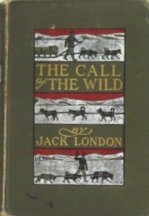
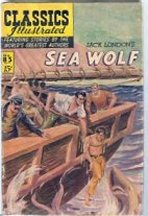
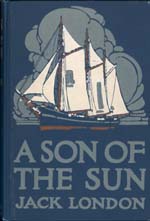
Both myself and other researchers are pretty
liberal about ERB's reading list but as I have cautioned before the bulk
of his reading for these early stories had to be done between 1900 and
1911 when he was a very busy man with troubles in mind not to mention excruciating
headaches. Along with newspaper and magazines he surely couldn't
have read more than two or three hundred books if that many. He may
have read a number of sea stories in various magazines, at any rate, but
his sea lore is second hand, unreliable and unknowledgeable.
He has the Lotus tending Southwest toward the
Philippines having begun in Hawaii. The Philippines is a large archipelago
blending into the massive archipelago just South of it, thus the Lotus
should have been in equatorial waters where the trade winds blow.
Most of your monster storms are further North or South. I was in
the Navy making one tour from California in the East to China in the West,
South to Australia and North to Japan. I had the terrifying experience
of passing through a typhoon off Japan which if it wasn't the storm of
the millennium I can't imagine a greater. Quite seriously, we all
thought we were going to die. My only thought was that the water
was going to be awfully cold when I hit it.
I do not jest when I say the waves were seventy-five
feet high, you're right, why not make it a hundred, maybe they were a hundred,
two would be stretching it, I was standing on the bridge twenty-five feet
above the waterline looking straight up at the crest of the waves when
we were in the trough. OK. A hundred twenty-five then.
We were so far down in the trough there was no wind, nor did the waves
break over us, they just slid under the ship raising us to the crests and
then we slid down the other side. I kid you not.
Then as we came down from the crest, way up
there, at the bottom of the trough some submarine current presented a barrier
like a stone wall that the ship slammed into bringing it to a complete
halt left and right and fore and aft. These troughs were not rows
of waves and troughs, no no, but huge bowls perhaps a mile or more long.
Our ship was three hundred six feet long so there we were a speck, an atom,
a proton sitting quietly in the midst of this huge bowl waiting for the
fly swatter of fate to fall.
I had been thrown across the deck from port
to starboard when we slammed into the current. I scrambled to my
feet, noticed that the starboard watch, Engelhardt, was on the way over
the side for a tete a tete with Davy Jones. I knew that Jones didn't
have time for an ordinary Seaman like Engelhardt or me so I grabbed his
belt and pulled him back aboard, then ran over to port to wait to die.
Now that was a storm. I don't know how
we rode it out, I thought the end had come, was past. So, why did
I tell that? Because ERB's storms are ludicrous and in the wrong
place. A cloud appears, the next thing you know a few indeterminate
big waves show up and the ship sinks but the lifeboats survive. All
this in equatorial waters. Well, if you've never been in it, it might
sound alright.
It doesn't matter because those sudden squalls
in ERB's stories represent his confrontation with John the Bully.
Within the twinkling of an eye ERB's whole direction in life had changed.
His had been for the worse but Byrne's was
for the better. This then reflected the change in Burroughs' own
fortunes.
Byrne and the crew are thrown up on an unidentified
island somewhere in the South seas, but a fairly large one. In those
years one could believe that there were islands yet undiscovered.
This one has a river big enough to allow for a largish island in the middle.
It is here that Byrne will get his introduction to the finer side of life.
However not before some very exciting and exotic adventures showing Burroughs
at his best.
Apart from Jules Verne, who might also be an
influence in this book through his Mysterious
Island which had a tremendous influence on Burroughs though the
book was not in his library. ERB seems to be familiar with a number
of French authors. He had The
Mysteries Of
Paris by the incredible Eugene Sue in his library, while it is
fairly obvious he had been suitably impressed by Victor Hugo's Les Miserables.
The sewer scene in his next book, The Mad King, is indicative of
that while Theriere in this book may be a variation on Thenardier.
He was also familiar with Dumas' Three Musketeers as there are several
references to that one including the sequel to this one, Out There Somewhere,
when he indicates an intent to create his own three Musketeers in Byrne,
Bridge and Burke.
As indicated in my Only
A Hobo, ERB was probably immersed in US-Japanese relations which were
fairly hot at this time as well as remembering the Japanese
exhibit at the Columbian Expo of 1893. He gets his facts right
too.
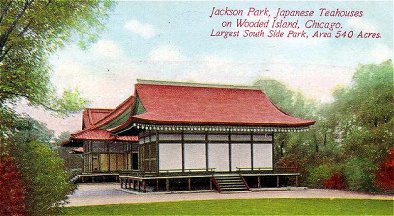
In this case the island is populated by an
indigenous population which has been blended with a group of Samurai warriors
from Japan. Burroughs correctly indicates that the Samurai
had come to the island just before Japan was closed to the world in the
early seventeenth century. From about 1620 to about 1860 - Perry
opened Japan in 1853 - no one had been allowed to enter or leave Japan
so ERB has been doing his homework. Over the three hundred years
a degenerate society of militant Samurai had combined with indigenes to
create a culture of savages. An interesting anthropological notion
not too unlike the Lord Of The Flies which has been a literary staple
for the last sixty years.
Byrne and Theriere engage in a terrific conflict
to rescue Barbara Harding from the Samurai during which Theriere is killed
and Byrne seriously wounded. Barbara Harding nurses him back to health
in an idyllic glen by a babbling brook.
At this point Byrne is reunited with his Anima
ideal. Barbara is going to rehabilitate this guy. He has made
some few steps toward his own redemption but the following is the quality
Barbara has to work with as described by ERB p. 17:
...Billy was
a mucker, a hoodlum, a gangster, a thug, a tough. When he fought,
his methods would have brought a flush of shame to the face of His Satanic
Majesty. He had hit oftener from behind than before. He had
always taken every advantage of his size and weight and numbers that he
could call to his assistance. He was an insulter of girls and women.
He was a bar-room brawler, and a saloon corner loafer. He was all
that was dirty, and mean, and contemptible, and cowardly in the eyes of
a brave man, and yet, notwithstanding all this Billy Byrne was no coward.
He was what he was because of training (conditioning) and environment.
He knew no other methods, no other code.
As Burroughs says, up to this time Byrne had been
an insulter of women, abusive to the whole female sex, probably including
his mother. It is only now that his eyes begin to open to what Jack
London would call the wonder of woman. How far Byrne reflects ERB's
general attitude toward women isn't clear although by the end of his life
his misogyny was becoming pronounced. He was certainly no ladies
man prior to his marriage to Emma. I am not certain he would have
married if it hadn't been for the competition with Martin. The suddenness
of the marriage after the Toronto incident indicates a Martin influence
or else he was bonkers after the blow. When he later said Tarzan
should never have married he was undoubtedly talking about himself.
He certainly never placed Emma first, being always ready to accept an army
commission, fight in Central America, seek a commission in the Chinese
army or become a war correspondent all of which would have left Emma and
the kids at home.
At the same time Barbara who had detested Byrne
becomes softened to him preparing her to love him once they moved downstream
to Manhattan Island. this may be some romanticized version of his
relationship with Emma after Toronto although she seems to have been fixed
on Burroughs from childhood. At any rate the relationship comes to
fruition downstream where the high brow Barbara attempts to raise the brow
level of Byrne.
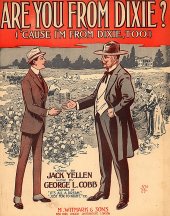 If one takes high brow, low brow seriously being thought of as a low brow,
that is inferior, can be annoying. Since Burroughs has chosen in
his first novel within the cocoon of Girl From Farris's to write
around the theme of a low brow hero I think it fair to believe it irritated
him to be thought of as a low brow; especially so as in most instances
he was much better educated than those who so named him. Chief among
these was his wife Emma. Whereas she had been trained to operatic
arias ERB played the hillbilly tune Are
You From Dixie? over and over on his phonograph. Hillbilly
music really irritates the operatic type. There must have been constant
conflict in the household.
If one takes high brow, low brow seriously being thought of as a low brow,
that is inferior, can be annoying. Since Burroughs has chosen in
his first novel within the cocoon of Girl From Farris's to write
around the theme of a low brow hero I think it fair to believe it irritated
him to be thought of as a low brow; especially so as in most instances
he was much better educated than those who so named him. Chief among
these was his wife Emma. Whereas she had been trained to operatic
arias ERB played the hillbilly tune Are
You From Dixie? over and over on his phonograph. Hillbilly
music really irritates the operatic type. There must have been constant
conflict in the household.
Emma especially looked down on boxing as low
brow. ERB was an ardent boxing fan, while here he chooses a low brow
boxer as hero. ERB could have some startling opinions on what was
high brow. He thought auto races were high brow. I don't know
what the crowds were like back then but I've been to the stock car races
where I have found high brows conspicuous only by their absence.
But, to the Mucker. Moving downstream
after his recovery on this rather large river coming closer to the estuary
they hit an island. Being bounded as it were by a Hudson on one side
and an East River on the other they named the island Manhattan. There's
kind of a nice Expo twist and joke here as in Chicago on the Wooded
Island one came upon a Japanese settlement in the middle of the city;
here on a Samurai Island in the Pacific one comes upon a Manhattan Island
of Americans. Kind of cute reversal, don't you think?
As Billy has to know some details about Manhattan
to keep the story moving, Burroughs rather lamely invents a couple trips
Billy had made to New York with the Goose Island Kid. As the boxing
scene Burroughs describes, with the exception of the Big Smoke is entirely
Irish one might note the origin of the name of The Goose Island Kid.
Goose Island was an area in the Chicago River inhabited by the poorest
of the Irish, so the Kid comes from the bottom of the social scale even
below Byrne's origins. One should contrast this with Burroughs prized
English ancestry.
Burroughs is writing from experience either
psychological or real. Thus one asks when was ERB in New York to
acquire his knowledge of the city. Well, let's see? He had
an extended stay in 1899. That was the trip when he got bashed in
Toronto. Then he had a short stay at the invitation of Munsey.
Most of what he knew must have come from the 1899 trip.
On their desert Manhattan Island Barbara, who
up to this time had been repelled by Byrne makes an attempt at deconditioning
Byrne from a Mucker and reconditioning him as an upper class New
Yorker. The conditioning consists of ridding him of the horrific
characteristics attributed to him by ERB while teaching him to speak in
an educated manner. As there was no tableware she couldn't teach
him which fork to use.
Possibly this scene may reflect on the first
couple years of Burroughs' married life. Remember that ERB hadn't
been much around polite society from the year of twelve to twenty-five
during which he was conditioned to his low brow attitudes. Emma had
been brought up in a high brow environment so that she may have felt the
need to instruct her new husband in some of the finer points of good manners.
When Frank Martin (see my Four
Crucial Years) asked ERB to go to New York with him in 1899 he did
so with a heart full of malice. He was competing with Burroughs for
Emma Hulbert's favors and, as is commonly believed, all's fair in love
and war.
The evidence points to the fact that he intended
to have ERB murdered in Toronto to clear his path to the woman. Along
the way he must have done his best to humiliate his rival - the mucker
Ed Burroughs.
ERB was moving in much faster company than
he was used to. While coming from a once affluent family his people
were falling on hard times. ERB's income was little more than sixty
dollars a month while Frank Martin, the son of a millionaire, could blow
that much on dinner every night of the week.
Riding in Martin's father's private railcar
one imagines that ERB's suit compared to the fabulous duds of Martin was
laughable. The contrasts between their two stations must have been
even more laughable and very satisfying to Martin. Martin would have
considered himself a high brow to Burroughs' low brow.
Once in New York Martin's hospitality didn't
extend to living quarters. ERB gives no indication of how much money
he took along or where he got it. I should be surprised if he had
so much as two hundred dollars, certainly no more. However much he
had there was no way he could have kept up with the Martins.
His address while in New York was down in the
Bowery while the Martins' was in a better part of town, perhaps Riverside
drive. Danton Burroughs has a picture of the three of them - Burroughs,
Martin and Martin's other companion, R.H. Patchin, on Coney Island.
One hopes Danton will release the photo to ERBzine along
with any other information he may have. Coney Island would be good
low brow entertainment to offer Burroughs, something he could afford.
A possible account of how Burroughs felt during
his dependency on Martin can be found in one of the volumes in ERB's library:
The
House Of Mirth by Edith
Wharton. The reading of it must have brought pangs of recognition
to ERB.
In the Mucker Billy Byrne speaks of Riverside
Drive and the Bowery in this way:
"Number one,
Riverside Drive," said the Mucker with a grin, when the work was completed;
"an' now I'll go down on the river front an' build the Bowery."
"Oh, are you from New
York?" asked the girl.
"Not on your life,"
replied Billy Byrne. "I'm from good ol' Chi but I been to Noo York
twict with the Goose Island Kid, so I knows all bout it. De roughnecks
belong on de Bowery, so dat's what we'll call my dump down by de river.
You're a high brow, so youse gotta live on Riverside Drive, see?" and the
mucker laughed at his little pleasantry
In 1913 the only real experience Burroughs had
with New York was the 1899 trip so that one can guess that when the Martin
Party left the train Burroughs as a 'roughneck' went to the Bowery while
Martin and his group went to Riverside Drive or its equivalent. Surely
Burroughs realized he had been duped at this point and felt it keenly.
Or, perhaps, he didn't catch on until much later having thought about it
for a while. Referring to the Irish Martin as The Goose Island
Kid who took him to New York may be a belated disguised slap in the face.
If Martin read the book I'm sure he would have understood.
At this point in the novel Barbara begins Byrne's
deconditioning teaching him the Riverside patois thus giving him true English
as a second language to his native muckerese. Thus Byrne is to some
extent rehabilitated as a human being; however as he ruefully learned there
is more to reconditioning than language.
At this point Byrne has a dual personality.
He is the low brow mucker and a high brow mucker in that he has learned
certain mannerisms and he can speak both forms of English.
If the scene on Manhattan Island to some extent
reflected the relationship between ERB and Emma then the seeds of his discontent
which will result in the divorce are already sown. The parting from
Barbara at the end of the story may be the first prefiguration of his divorce.
On the other hand Byrne has been temporarily
reunited with his Anima figure somewhat in the manner of Eros and Psyche
in Greek Mythology which makes him a complete being, his X and Y chromosomes
being reconciled. They are soon split apart again as he and Barbara
find their separate ways to NYC.
4.
Upon Byrne's return to NYC Burroughs begins
to wrestle with the problem of the displacement of a White heavyweight
boxing champ with a Black one. In our age when Boxing has become
a totally Black sport it is difficult to see the real significance of Jack
Johnson's assumption of the championship for both Whites and Blacks.
The success of Johnson also came at a time when in competition with immigrants
the Anglo 'old stock' was being displaced from a feeling of rightful preeminence
in a country it had made.
This displacement by immigrant's also occurred
at the time when the ranks of the European conquerors of the world had
reached their limitations and the conquered began to roll them back.
Thus one has such volumes of the period as Madison Grant's The Passing
Of The Great Race and Lothrop Stoddard's The Rising Tide Of Color.
The world was mysteriously changing, slipping from beneath their feet.
Complementary to the works of Grant and Stoddard,
but not influenced by them, was the work of such writers as Burroughs,
Zane Grey and Jack London. A common thread in the work of all three
is the displacement of the 'old stock' by immigrants. London has
a telling phrase in his Valley Of The Moon when his character Billy
Roberts is told that the 'old stock' had been sleeping and that now like
Rip Van Winkle they were awakening to a new world that had changed while
they slept. This theme would reappear in such works as Booth Tarkington's
The
Magnificent Ambersons and Burroughs' own The
Girl From Hollywood later in the decade.
The social conflicts are treated almost identically
by all three authors.
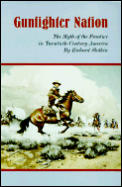 Richard Slotkin in his Gunfighter
Nation attempts an exhaustive treatment of the problem from the
Gustavus Myers' immigrant/unskilled labor point of view which may be contrasted
with that of our three masters. I will discuss this a little later.
Richard Slotkin in his Gunfighter
Nation attempts an exhaustive treatment of the problem from the
Gustavus Myers' immigrant/unskilled labor point of view which may be contrasted
with that of our three masters. I will discuss this a little later.
Great changes were in progress. To try
to characterize them from a single point of view as the Myers' school does
is both foolhardy and pernicious. While the immigrants and unskilled
labor have their story it is only their story, a small part of the whole.
While one can sympathize with anyone, anywhere, one cannot accept their
point of view as definitive on which point they insist. My heart
goes out to everyone but does not rule my head.
The argument then breaks down broadly between
the Liberal Coalition and, what name is appropriate for the other side?
- the rational?, the realistic?, the conservative?. Why not settle
for the Conservative with all its limitations. Yes, I am unapologetically
conservative. No more limitating actually than calling the irresponsibility
of the Coalition liberal. I fail to see the liberality.
The argument devolves into the two factions
of the 'old stock' with the conservative wing being hopelessly outnumbered
when the liberal wing aligned themselves along national and racial lines
with the immigrants and the Blacks and along political and religious lines
with the Judaeo-Communists or more conveniently - the Reds. Reds
is shorter.
That writers of the bent of Burroughs, London and
Grey have survived at all, let alone remained popular, in such an environment
is remarkable indeed.
From 1910 to 1919 major events that affected
our writers occurred and typified the decline of Euroamerica from its pinnacle
of self-satisfaction. The Great War which ran from 1914 to 1918 shattered
the image of Euroamerica before the rest of the world. Successful
resistance not only appeared possible to the defeated peoples but probable.
Note the advantage Japan took of the debacle.
A second event almost prefiguring the Great
War was the sinking of the great ship RMS Titanic in 1912.
Billed as unsinkable it represented the peak of Euroamerican scientific
and technological skills. When that Great ship went down on its maiden
voyage it took a great deal of the West's confidence down with it.
While the West watched in dismay and horror the rest of the world wildly
cheered the West's discomfiture. Unsinkable, indeed!
But perhaps the single most disastrous blow
to the pride of the Euroamericans was when the Black Jack Johnson laid
the pride of the Whites, Jim Jeffries down in the fourteenth on July 4,
1910. The mighty Casey, Jim Jeffries, had struck out. The much
despised Negro, Jack Johnson, walked away wearing the world heavyweight
championship belt.
The Whites howled, they rioted but they had
shot their best shot and there was no backup. No contender.
No hope.
Jack London actually reported on the fight.
He was there. Ringside. Nor was he charitable toward Jack Johnson.
He said things that might better have remained unsaid. We have no
indication as to what Burroughs thought at the time. By the time
he spoke publicly in The Mucker he had had time to mature his thoughts.
The effect on London was traumatic. In
1911 he published his book The Abysmal Brute, his first thoughts
on the fight. The fight not yet out of his system London expressed
himself still further in his 1913 novel The
Valley Of The Moon. I've said it before. I'm no Jack
London fan. I've only read him more or less at the insistence of
ERBzine's Bill Hillman. If I had gone to the grave without reading
The
Call Of The Wild and The Sea Wolf I wouldn't have considered
it a loss. Not the same with Valley Of The Moon. This
book along with ERB's Bridge And The Oskaloosa Kid; is one of the
neglected masterpieces of twentieth century American literature.
It alone justifies London's excellent reputation.
The story is that of two Oakland, California
young people Billy Roberts and his sweetheart Saxon Brown. While
lamenting the displacement of the 'old stock' by the immigrants London
also makes this a boxing story along the same lines as the Mucker.
In fact the stories are quite similar in conception.
If one didn't know that they were writing at the same time 2500 miles from
each other one would think they may have written on the theme as a bet.
London, too, must have been influenced by the midnight flight of Johnson
from Chicago. London makes Roberts an outstanding boxer in the Bay
Area. Roberts gives up boxing both because of the fate of boxers
and because of the low brow fans. Later in the book he says that
Roberts sparred with both Jim Jeffries and Jack Johnson.
After a long period of unemployment in an attempt
to win a hundred dollar prize to relieve he and Saxon's poverty he agrees
to go back into the ring, squared circle, as Burroughs always refers to
it. The fight with the Chicago Terror is very reminiscent of the
Jeffries-Johnson battle. Like Jeffries Roberts hasn't fought for
a long time. Like Jeffries he was out of condition. After retiring
in 1905 Jeffries had taken up farming blossoming out to three hundred
pounds. When the call came to redeem the honor of the White species
sometime after 1908 Jeffries had to quickly get into condition losing all
the extra tonnage.
He had certainly not regained his top form,
timing and mental focus when he climbed into the ring to face Johnson.
I make no excuses but as Jeffries said he saw his openings but his unconditioned
reflexes didn't allow him to take advantage of them. His failure
broke the hearts of his followers.
The battle between Roberts and the Chicago
Terror, Johnson must have been intended, is probably a replay of the 1910
fight as seen by London. Out of condition and rusty Roberts gets
mauled from start to finish. In an attempt to salvage special pride
London has Roberts at least stay on his feet till the twentieth unlike
the fourteenth round fall of Jeffries.
Toward the end of Valley Of The Moon
London has Roberts climb into the ring once again, this time against a
Big Swede, sort of polar to the Big Smoke. In the second of two bouts
Roberts has difficulty putting the Big Swede away until the fourteenth.
Also a replay of the Jeffries-Johnson fight with Roberts/Jeffries winning
this one, if only in Jack's dreams.
Thus the anguish of the loss surfaces three
years later. Now, that the two events, the Titanic and fight, get
confused in this shuddering defeat of Euroamerica is interestingly made
evident in the song Jack Johnson And The Titanic. In the song Jack
Johnson goes down to the steamship line in England to buy passage for his
White wife and himself. He is told that no Black Folks are allowed
on the Titanic. As some sort of divine punishment for refusing him
the great ship sinks.
Obviously Jack Johnson couldn't have been refused
as in 1912 he was still in Chicago fighting to stay out of jail.
But the two White disasters became mingled in imagination.
While Johnson was wrestling with the Johnson
Affair in Valley Of The Moon Burroughs was doing the same in his
Mucker.
One wonders what a further search of popular literature would reveal.
In The Mucker Burroughs has gotten Byrne back
to New York City. Broke and with no means of a livelihood the big
man-beast turns to the only thing he can do which is boxing.
While London, who had witnessed the fight essentially retold it in Valley
Of The Moon, Burroughs who didn't prepares Byrne to redeem the Whites
by fighting and defeating the Big Smoke. Burroughs doesn't mention
Johnson by name. He uses Big Smoke, big dinge,
Burroughs immediately places Byrne in the role
of the next hope. At the time these boxers were known only as hopes
the term Great White Hope in the completely derogatory sense evolved later.
Like London Burroughs minces no words about Jim Jeffries being his favorite.
Not only does Byrne imitate Jeffreies by fighting from a crouch but 'Professor'
Cassidy his trainer says:
For a few minutes
Billy Byrne played with his man, hitting him when and where he would.
He fought, crouching, much as Jeffries used to fight, and in his size and
strength, was much that reminded Cassidy of the fallen idol that in his
heart of hearts he still worshipped.
Winning that fight Byrne went on to meet the #1
contender who he handily defeated. Having evoked the ghost of Jim
Jeffries Burroughs brings in his other hero, Gentleman Jim Corbett.
The following
morning the sporting sheets hailed "Sailor Byrne" ( a tribute to Jack London
whose hobo moniker was Sailor Jack) as the greatest white hope of them
all. Flashlights of him filled a quarter of a page. There were
interviews with him. Interviews of the man he had defeated.
Interviews with Cassidy. Interviews with the referee. Interviews
with everybody, and all were agreed that he was the most likely heavy since
Jeffries. Corbett admitted that, while in his prime, he could doubtless
have bested the new wonder, he would have found him a tough customer.
Jeffries, Corbett, Byrne, a combination with so
much magic in the names couldn't help but win back the title to salve the
wounded pride of the White species.
Cassidy wired
a challenge to the Negro's manager, and received an answer that was most
favorable. The terms were, as usual, rather one sided but Cassidy
accepted them, and it seemed before noon that the fight was assured.
Assured in dreams, of course, as this was a novel.
It would be quite easy to pass over this part
of the tale without realizing its significance but it shows the pain and
suffering, the loss of pride that occurred when the championship went Black.
While Burroughs has no difficulty invoking the names of the fallen idol
Jeffries and Corbett he cannot bring himself to name Johnson referring
to him only as The Big Smoke, the big dinge or the Negro. The White
world was in a deal of pain.
One can only guess how Burroughs intended to
resolve his dilemma of having the fictional Byrne fight the living Johnson
or perhaps the story was only a magic incantation to arouse the true hope.
At any event when Byrne next appears in story in 1916's Out There Somewhere,
Jess Willard had already taken the championship back although under dubious
circumstances. By 1916 Byrne's boxing career is forgotten; there
is no mention of it in the sequel.
Having solved the problem of the championship
Burroughs returns to his Anima problem in the romance with Barbara Harding.
He remembers she lives in New York City and decides to call on her.
...a single
lifetime is far too short for a man to cover the distance from Grand Avenue
to Riverside Drive....
While the above words were spoken about Billy,
Byrne too came to the same conclusion.
But some strange
influence had seemed suddenly to come to work upon him. Even in the
brief moment of his entrance into the magnificence of Anthony Harding's
home he had felt a strange little stricture of the throat- a choking, half-suffocating
sensation.
The attitude of the
servant, the splendor of the furniture, the stateliness of the great hall
and the apartments opening upon it- all had whispered to him that he did
not "belong."
So Byrne feeling his inability to fit in walks
away in bitter pride forswearing his love for Barbara Harding. Still,
he could remember her saying back on that other Manhattan Island:
I love you Billy
for what you are.
Thus this epic of the low brow Billy ends as he
walks down the street a study in dejection with Barbara's words ringing
through his mind.
The question here is how much the relationship
between Byrne and Barbara is a 'highly fictionalized' account of ERB's
own relationship with Emma. We can't know for sure how hurt Burroughs
may have been by Emma's calling him a low brow. Perhaps he longed
to hear her say to him: I love you Ed, just the way you are.
Certainly the stories enveloped by The Girl
From Farris's all deal with his relationship with Emma as his
Anima ideal. The
Mad King which follows this story details the problems of the hero
getting on the same wave length with the Princess Emma. He even uses
her real name. The following title- The
Eternal Lover- speaks for itself, Beasts
Of Tarzan features a wild chase with Tarzan trying to find Jane
who is lost in the jungle, while the last of the series, The
Lad And The Lion, details the troubles of the Lad finding his desert
princess. After the Lad he got past his mental block being able to
close The Girl From
Farris's.
So, if these stories are read consecutively
they record the struggle going on in ERB's mind to reconcile Emma to his
Anima ideal and his Anima to his Animus. This is a task for not any
but the most dedicated Burroughs scholar but I would be interested in learning
the opinion of any who might attempt it.
Read only Book One of Mad
King and the first part, Nu Of The Neocene, of Eternal
Lover in this context.
Ten years later ERB tackled the problem from
the high brow point of view in Marcia
Of The Doorstep.

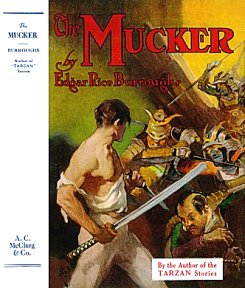

![]()
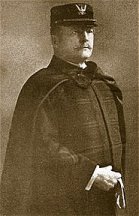
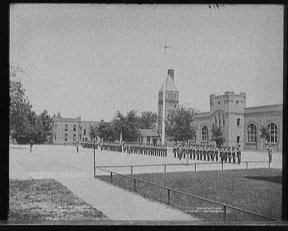
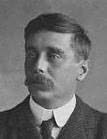
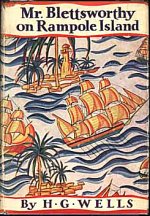 The psychological baggage Burroughs brings to his writing to exorcise is
considerable. When H.G. Wells portrayed ERB as insane in Mr. Blettsworthy
On Rampole Island there was an element of truth while the case was
overstated. ERB was apparently able to disappear into himself while
he was writing thus living an alternate reality which is what Wells was
talking about.
The psychological baggage Burroughs brings to his writing to exorcise is
considerable. When H.G. Wells portrayed ERB as insane in Mr. Blettsworthy
On Rampole Island there was an element of truth while the case was
overstated. ERB was apparently able to disappear into himself while
he was writing thus living an alternate reality which is what Wells was
talking about.
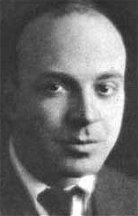
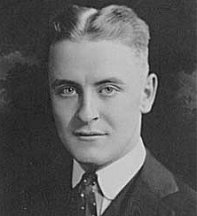
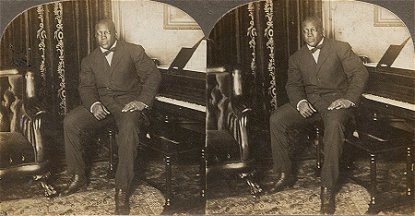
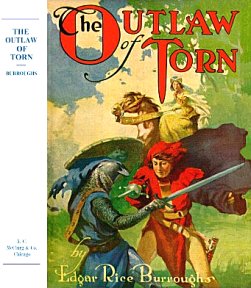 A major consequence of his confrontation with John the Bully is that it
declassed him. ERB's Animus became part prince, part pauper;
part outlaw, part orthodox as demonstrated in his
A major consequence of his confrontation with John the Bully is that it
declassed him. ERB's Animus became part prince, part pauper;
part outlaw, part orthodox as demonstrated in his 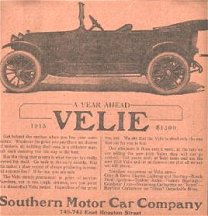 Why would a man do this? ERB had apparently bought his used car,
a Vellie, at the beginning of 1913 when for all practical reasons he was
still broke. Why the urgent need to hop a train? I think the
reason can be traced back to Frank Martin. The humiliation of the
trip East in a private car in 1899 and the subsequent stay in the Bowery
while the Martins lived on Riverside Drive had to be compensated.
While ERB couldn't afford a private car he could at least travel first
class which he did. While there are many reasons for wanting a car
it is very probable that he felt the need to compete with Martin.
Thus rather than wait to be able to afford a new car he rushed out to buy
a used one which was apparently as much as he thought he could afford at
the time. On the other hand as his characters always say of themselves:
For me, to think is to act. If the Martins, among other 'plutocrats',
wintered in Florida then as ERB could still not compete with them financially
he went West.
Why would a man do this? ERB had apparently bought his used car,
a Vellie, at the beginning of 1913 when for all practical reasons he was
still broke. Why the urgent need to hop a train? I think the
reason can be traced back to Frank Martin. The humiliation of the
trip East in a private car in 1899 and the subsequent stay in the Bowery
while the Martins lived on Riverside Drive had to be compensated.
While ERB couldn't afford a private car he could at least travel first
class which he did. While there are many reasons for wanting a car
it is very probable that he felt the need to compete with Martin.
Thus rather than wait to be able to afford a new car he rushed out to buy
a used one which was apparently as much as he thought he could afford at
the time. On the other hand as his characters always say of themselves:
For me, to think is to act. If the Martins, among other 'plutocrats',
wintered in Florida then as ERB could still not compete with them financially
he went West.
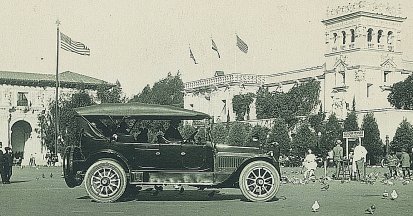
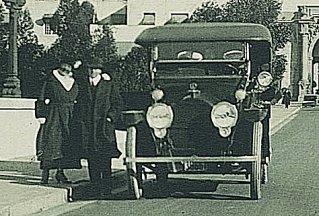





 Richard Slotkin in his
Richard Slotkin in his 
